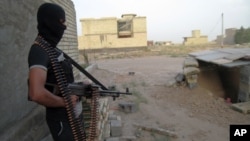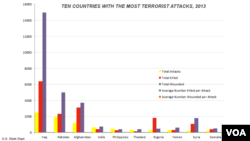The U.S. State Department says al-Qaida and its affiliates continue to present a serious threat to the United States and its allies.
The State Department's annual report on terrorism says losses in al-Qaida's core leadership in Pakistan and Afghanistan have "accelerated" the network's decentralization. It says that has resulted in "more operationally autonomous" and "more aggressive" affiliates, notably in Yemen, Syria, Iraq, northwest Africa and Somalia.
According to the report, Iran remains a major state sponsor of terrorism and continues to defy demands it prove its nuclear ambitions are peaceful.
The report says terrorist violence in 2013 was fueled by sectarian motivations, in particular in Syria, Lebanon, and Pakistan, where victims were primarily civilians.
The State Department says al-Qaida and its affiliates have increased their financial independence by kidnapping for ransom, and other criminal activities such as extortion and credit card fraud. It says private donations from the Gulf also remained a major source of funding for Sunni terrorist groups, particularly in Syria, where it said on the other side, Iran, Hezbollah, and other Shia militias provide a broad range of support to the Assad regime.
The report cited Syria, Cuba, and Sudan, in addition to Iran, as continuing state sponsors of terrorism.
"Lone offender" violent extremists also continue to pose a serious threat the report says, citing the April 15, 2013 attacks near the Boston Marathon finish line, which killed three and injured approximately 264 others.
Africa also "experienced significant levels of terrorist activity" last year, according to the report. It says the Somalia-based al-Shabab is the continent's main threat.
But it pointed out successful efforts by French and African forces to push back al-Qaida in the Islamic Maghreb and other extremist groups in northern Mali.
The State Department also noted the number of rocket attacks on Israel by Hamas militants from the Gaza Strip and Sinai was the lowest in more than a decade. Just 74 rockets were launched compared to 2,557 in 2012. Israeli authorities said only 36 actually hit southern Israel last year.
The State Department's annual report on terrorism says losses in al-Qaida's core leadership in Pakistan and Afghanistan have "accelerated" the network's decentralization. It says that has resulted in "more operationally autonomous" and "more aggressive" affiliates, notably in Yemen, Syria, Iraq, northwest Africa and Somalia.
According to the report, Iran remains a major state sponsor of terrorism and continues to defy demands it prove its nuclear ambitions are peaceful.
The report says terrorist violence in 2013 was fueled by sectarian motivations, in particular in Syria, Lebanon, and Pakistan, where victims were primarily civilians.
The State Department says al-Qaida and its affiliates have increased their financial independence by kidnapping for ransom, and other criminal activities such as extortion and credit card fraud. It says private donations from the Gulf also remained a major source of funding for Sunni terrorist groups, particularly in Syria, where it said on the other side, Iran, Hezbollah, and other Shia militias provide a broad range of support to the Assad regime.
The report cited Syria, Cuba, and Sudan, in addition to Iran, as continuing state sponsors of terrorism.
"Lone offender" violent extremists also continue to pose a serious threat the report says, citing the April 15, 2013 attacks near the Boston Marathon finish line, which killed three and injured approximately 264 others.
Africa also "experienced significant levels of terrorist activity" last year, according to the report. It says the Somalia-based al-Shabab is the continent's main threat.
But it pointed out successful efforts by French and African forces to push back al-Qaida in the Islamic Maghreb and other extremist groups in northern Mali.
The State Department also noted the number of rocket attacks on Israel by Hamas militants from the Gaza Strip and Sinai was the lowest in more than a decade. Just 74 rockets were launched compared to 2,557 in 2012. Israeli authorities said only 36 actually hit southern Israel last year.






